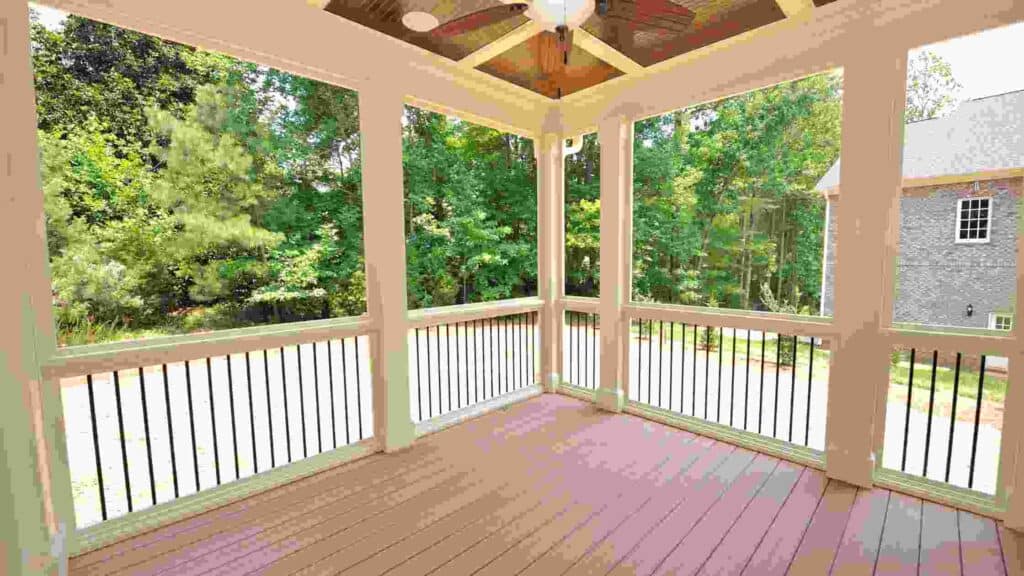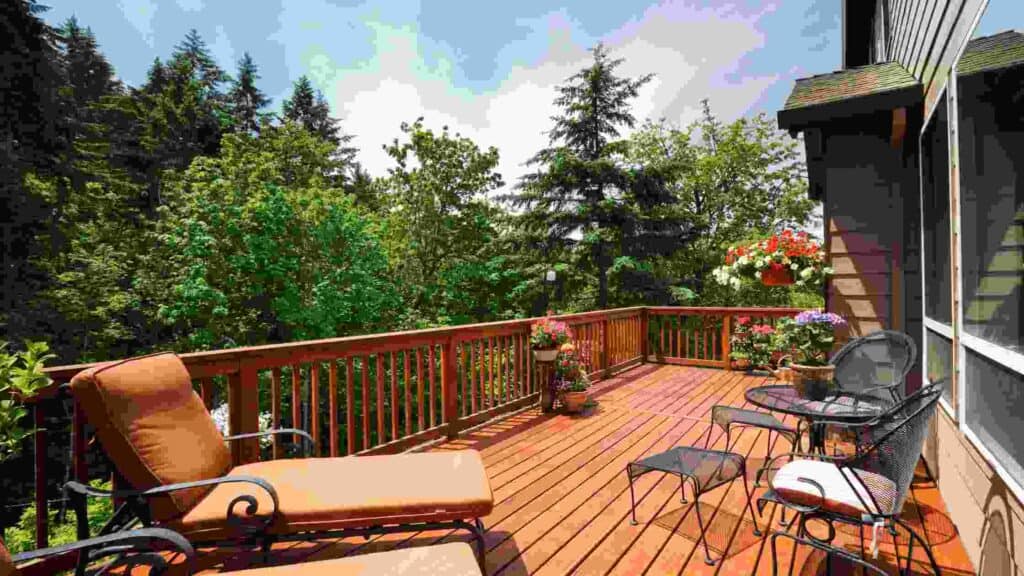In this guide, we’ll break down the difference between deck and patio, so you can make the right call for your needs and style.
Choosing between a deck vs patio can be a real head-scratcher! But don’t worry, we’ve got your back.
Difference Between Deck And Patio
Before we dive into the nitty-gritty of deck vs patio, let’s get a clear picture of what each of these structures actually is.
What Is A Deck?
Imagine an outdoor platform extending from your house, that’s a deck!
Decks are flat surfaces, usually made of wood, designed to support not just you and your friends but also all that comfy patio furniture you love.
They are often built at an elevated level of your home and come with a safety fence and a set of stairs leading to the rest of your backyard.
What Is A Patio In A House?
Now, let’s talk patios! These ground-level extensions are directly connected to your house and are crafted using concrete, paver stones, or bricks.
They offer a great space to hang out and relax, either out in the open or nestled amidst lush greenery.
Deck vs Patio Pros And Cons

Alright, it’s time to weigh the pros and cons. Let’s look at some key aspects.
1. Privacy: A Hideaway Retreat Or A Great View?
Now, if privacy is your priority, then a patio is the way to go! Patios, being ground-level and closer to your house, offer you a more intimate space.
You can easily create your private oasis by surrounding it with shrubs, and trees, or even adding a wooden roof for extra seclusion.
On the other hand, decks elevate you above the ground, giving you a commanding view of your surroundings. But remember, this also means you’ll be a bit more exposed unless you build a towering fence.
2. Durability: The Battle Of Longevity
When it comes to durability, we need to look at resilience and sturdiness.
Decks, being mostly made of wood, are charming but require some extra TLC. Wood can be affected by weather, leading to internal rot and eventual wear and tear. Find out: how long does a wood deck last?
On the other hand, patios, made from concrete and stones, are quite the troopers and can last longer. However, patios have their weaknesses too, like cracks and irreversible staining, especially in areas with wild weather swings.
With proper care, both decks and patios can stand the test of time, so it’s all about your preference here!
3. Uneven Terrain: Patio’s Challenge, Deck’s Perk
Uneven terrain can be tricky, especially when it comes to patios. These ground-level structures demand a perfectly flat and even surface to rest upon.
Sometimes, what seems level to our eyes might not make the cut for paving stones and concrete. So, measuring the land’s flatness is crucial, especially if you have a few hills around.
Now, here’s where decks have an advantage. Decks are way more forgiving when it comes to uneven ground. Thanks to those supporting beams, you can set up a deck without losing sleep over every tiny bump.
However, keep in mind that the lay of your land will have a say in your final decision, and it might sway you toward the patio path.
4. View: A Deck’s Elevated Vantage Point
Now, let’s talk about the view! And a deck’s got some serious advantages in this department. Being raised above the ground, decks treat you to some stunning views.
Picture this: you’re sipping your morning coffee while gazing at rolling fields, a tranquil lake, or any other breathtaking scenery.
Even if you don’t have a picturesque landscape, the elevated deck allows you to take in a sweeping view of your entire backyard, embracing the beauty of your own domain. It’s like having your own little lookout spot to appreciate the world around you.
However, bear in mind that the view might vary depending on your neighbors’ setups, so keep that in mind when you’re planning your deck (here’s the step-by-step process on how to build a backyard deck).
5. Maintenance: Ease vs. Care

When it comes to maintenance, patios take the easy road. They’re low-maintenance, requiring just a good cleaning to keep them looking fresh and stain-free.
Now, decks, being wood wonders, need a little more TLC. You’ll have to seal and restain them every few years to keep them in tip-top shape.
But that’s a small price to pay for the charm of a wooden deck, right? (Check out how often to stain deck)
6. Deck vs Patio Cost: Which Is Cheaper Patio Or Deck?
Let’s break it down. Decks, being alluring wood creations, tend to be pricier than patios. Wood costs more than your average patio materials, and you’ll need more of it to build a deck.
Plus, crafting a deck requires the expertise of skilled hands, which adds to the expenses. Generally, you can expect a square foot of deck to set you back anywhere from $20 to $50.
On the flip side, patios offer more choices when it comes to materials, with concrete being the more budget-friendly option. Building a patio should cost you around $10 to $20 per square foot, depending on your chosen materials.
So, if you’re counting those pennies, a patio might just be the more cost-effective route.
7. Heat Resistance: Staying Cool In The Summer
Summer fun on your mind? You’ll want a structure that doesn’t scorch your feet. Well, good news, wood is a natural heat insulator, absorbing sunlight without turning your deck into a hotbed of discomfort.
But watch out for paving stones and concrete in patios. On a sunny day, they can become sizzling hot, and walking barefoot might not be the best idea. Plus, the constant heating and cooling can speed up the cracking process for concrete patios.
8. Customizability: Express Yourself!
Both decks and patios offer a number of customization options. But there’s a little extra with decks. You can prime and paint wood to match your house or backyard decor, giving it that personal touch (find out the best deck paint).
And with decks, there’s more room to play around with additional elements like stairs, fences, and rails. You get to design the structure according to your taste and style, making it uniquely yours!
9. Needing A Permit
Depending on where you live, constructing a deck might require you to check the law. Some places demand a permit or other legal requirements before you embark on your deck-building adventure.
This is because decks can change the appearance of your home and must adhere to safety regulations, keeping you and your neighbors out of harm’s way. For more details, check out: Do you need a permit to build a deck?
On the flip side, patios usually get to skip the permit. They typically don’t need any legal permission, inspections, or waiting periods.
10. Weight Restrictions: Patio’s Solid Ground vs Deck’s Engineering
Weight is not an issue when it comes to patios!
These ground-level wonders sit on a solid foundation, capable of handling just about anything you throw on them. From stylish furniture to fancy amenities, patios have got you covered without breaking a sweat.
But decks have a different story to tell.
They rely on beams and other architectural elements, making their load-bearing capacity more dependent on the base and the type of wood used. The more stuff you want to deck out your deck with, the more engineering it’ll need, which can add to the cost.
11. Resale Value: Which Adds More Value A Deck Or Patio?

If you’re in it for the long game, let’s talk resale value! Building an outdoor extension as an investment to boost your property’s worth is a smart move.
According to those remodeling calculators, decks hold some serious ROI. You can expect a return on investment of around 70% with a well-built deck.
12. Safety Concerns: Slips And Falls
Both decks and patios can be safe when built properly. But watch out for a little slip-and-slide action on patios during icy days. They tend to get a bit slippery, so tread carefully!
As for decks, they have that elevated edge that might raise safety concerns. But with a sturdy railing or fence in place, you’ll be fine up there.
FAQs – Deck vs Patio
1. What’s the difference between a patio and a porch?
A patio is an outdoor space on the ground level, typically made of concrete, pavers, or stone, and may be covered or uncovered. A porch, on the other hand, is an extension at the front or back of a house, usually covered and supported by columns or posts.
2. Can a deck be called a patio?
While a deck and a patio are different in construction and placement, some people might use the term “patio” loosely to refer to a deck. However, strictly speaking, they are distinct outdoor features.
3. What’s the difference between deck and balcony?
A deck is an outdoor platform typically attached to a house and made of wood or composite materials. A balcony is a protruding platform that extends from a building’s upper levels, usually enclosed by a railing.
4. What makes something a patio?
A patio is typically characterized by its location at ground level, made with materials like concrete, stone, or pavers. It is commonly designed for outdoor dining, entertainment, or relaxation purposes, and it does not have a structure attached to a house like a deck does.
5. What’s the difference between raised patio vs deck?
A raised patio is constructed on the ground but elevated from the surrounding area, often supported by retaining walls. A deck, however, is always elevated above the ground and attached to the house.
Conclusion: Which Is Better Deck Or Patio?
And there you have it, the comparison between decks vs patios! Each has its own flair, and with this guide in your back pocket, you’re all set to make the right call.
Take a good look at what matters most to you, and let that be your guiding light. Whether you opt for a charming wooden deck with a view or a cozy patio close to the ground, it’s all about what suits you and your needs best.
So, deck or patio? The choice is yours to make. Happy building, and here’s to your perfect outdoor escape!
